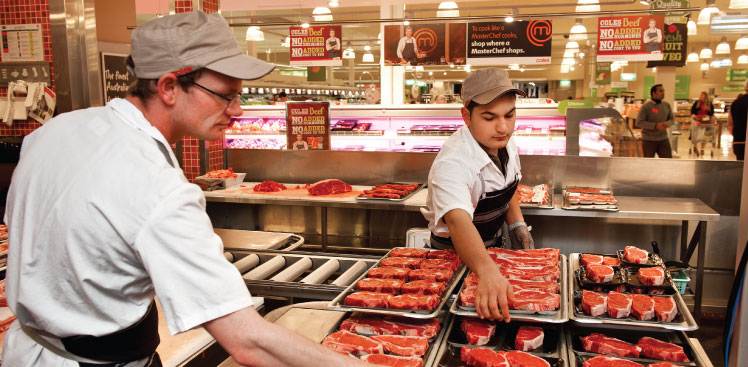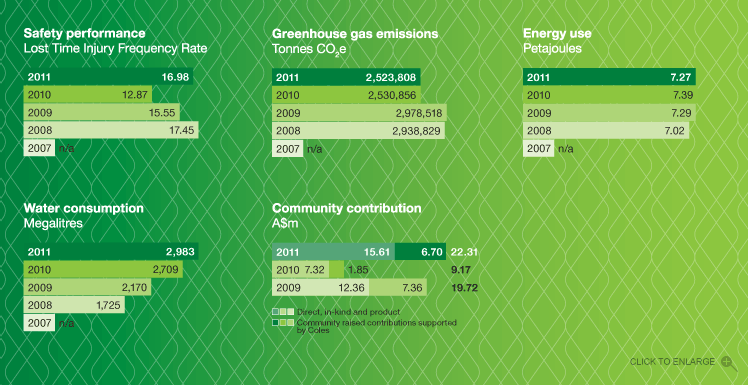Coles
Performance overview
Priorities and outcomes
-
Area 2010 Priority Outcome 
Training and
developmentTraining and development of our team members  Achieved
AchievedDelivered 1,178,724 training hours – up 32 per cent
More than 780 internal appointments made from our Retail Leaders and Retail Operations Graduate programs
Stakeholder engagement Customer trust in our product range, value and quality  Achieved
AchievedReceived a Good Egg Award from the RSPCA for announcing the phase-out of caged eggs by 2013
Received 30 product quality awards for Coles Brand and Coles Finest products
Announced the launch of Coles Quality Academy to provide Coles Brand suppliers with specific quality management training and provide targeted training for our team members
Safety Workplace safety for our team members  Not achieved
Not achievedOur LTIFR was 16.98 for the year, up from 12.87 last year, partly due to an increase in manual handling injuries in supermarkets and bringing our calculation methodology into line with other divisions of Wesfarmers
Delivered training programs to improve safety leadership and promote safety awareness
Community Support the local communities in which we operate  Achieved
AchievedInvested more than $22.3 million to community programs and emergency relief during the year – including $5.34 million in aid of the Queensland Premier's Disaster Relief Appeal 
Energy conservation Water saving and energy efficiency of our stores  Partially achieved
Partially achievedIntroduced two new energy data reporting systems to help track energy usage and energy efficiency projects
Worked with Green Building Council of Australia (GBCA) to finalise a 'Greenstar' rating tool for future freehold supermarket developments
Progressed other energy saving initiatives for stores:
• over 620 stores now have night blinds installed on refrigeration cases to reduce night-time energy use
• over 520 stores now have automatic lighting controls to reduce energy use outside trading periods
• more than 420 stores now have anti-condensate heater controls installed to glass door freezers which reduce the energy use of the heaters in the doors
Trialled the use of sensor taps to reduce water usage at our Store Support Centre at Tooronga, Victoria
Overview of the business
About our business
We are one of Australia's leading retail businesses, with brands including Coles and Bi-Lo supermarkets, 1st Choice Liquor Superstore, Liquorland, Vintage Cellars, Spirit Hotels and Coles Express.
We employ over 102,000 team members and operate more than 2,200 outlets. Approximately 18 million transactions take place in our stores each week.
At the heart of our business strategy is our goal: 'To give the people of Australia a shop they trust, delivering quality, service and value'.
Year in review
This year was the third year of our turnaround plan and we continued to refurbish our supermarkets with our new store design and increased the availability of self-scan checkouts.
We also delivered initiatives to build customer trust in our products and prices and in January 2011 launched our 'Prices are Down' program. As part of this, we lowered the prices of over 6,000 products.
Material issues
Our sustainability priorities are training and development of our team members; customer trust in our product range, value and quality; water saving and energy efficiency of our stores; workplace safety; and supporting the local communities in which we operate.
Sustainability highlights
Rebuilding after Cyclone Yasi and Queensland floods
During the year, over 25 Coles stores were affected by the Queensland floods and Cyclone Yasi – the worst of these were at Emerald, Fairfield and Ipswich.
To ensure the ongoing availability of basic food items for the town of Emerald, a temporary store was established at Emerald Police and Citizens Youth Club.
In June 2011, we were proud to re-open our doors at both Emerald and Fairfield, featuring our latest store format. A new store at Ipswich will be built in the coming year.
No added hormone beef
We were the first national food retailer in Australia to convert our fresh butcher beef to hormone growth promotant (HGP) free beef in January 2011, as research shows that growth promotants can have an effect on the eating quality of some cuts of beef.
Sow-stall free pork
Following our announcement in July 2010 that we would phase out sow-stall produced fresh pork by 2014, we extended our commitment to include hams and bacon made from local and imported pork.
We have commenced auditing potential sow-stall free farms in South Australia and Victoria.
Good Egg Award
In December 2010, we were proud to receive a Good Egg Award from the RSPCA for announcing we would no longer sell caged eggs from 2013.
RSPCA-approved products
We launched an RSPCA-approved range of chicken products in April 2011. The new range is available in Victoria, Tasmania and South Australia and is the fourth RSPCA-approved product we have launched, following pork, turkey and barn-laid eggs.
Sustainable seafood with WWF-Australia
In March 2011, we announced a three-year program with WWF-Australia, a leading authority on marine sustainability, to deliver sustainable seafood across Coles-branded fresh, frozen and canned fish.
Our program will ultimately result in more Marine Stewardship Council (MSC) certified seafood stocked at Coles.
Coles Carisma
Coles Carisma, a new potato launched in 2010, took out the Marketing Award at the AUSVEG National Awards of Excellence.
Coles Carisma is the only potato in Australia to carry the official low glycemic index (GI) symbol from the Glycemic Index Foundation.
Food donations
During the year, we donated over 1.1 million kilograms of food to people in need through Foodbank Australia, SecondBite and The Salvation Army.
We also conducted a pilot program to collect fresh produce from 20 supermarkets in Victoria, Tasmania, South Australia, Western Australia and Northern Territory in the lead-up to launching a national fresh food donation program in the coming year.
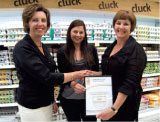
RSPCA Australia's Heather Neil (left) presents a Good Egg Award to the Coles team – Tanya Kleman (centre) and Jackie Healing.

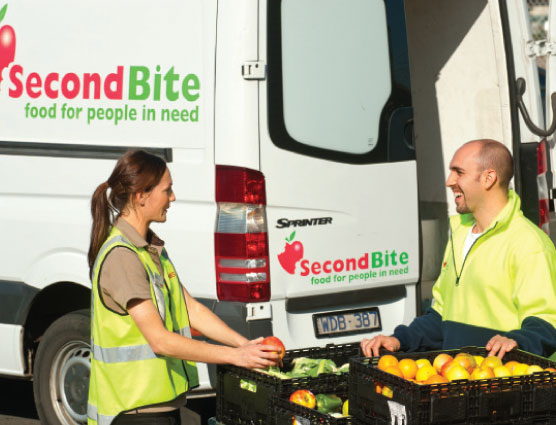
People
As at 30 June 2011, we employed 102,520 team members, of which 88,579 worked in our supermarkets, 8,296 in liquor stores and hotels and 5,645 in fuel and convenience outlets.
Our total workforce number is lower as a result of our strategy of employing more permanent part-time team members and reducing the percentage of casual team members employed since 2008.
In June 2011, we conducted our annual Face of Coles survey to provide an insight into the profile and diversity of our workforce.
Through these survey results we understand there are 424 team members who identify themselves as being Aboriginal or Torres Strait Islander compared with 275 at the same time last year.
Indigenous employment
During the year, we announced our Aboriginal and Torres Strait Islander Plan to help us be more representative of the communities we serve and in May 2011 we supported National Reconciliation Week, holding our first Dreamtime Event at our store support centre in Tooronga, Victoria.
The biggest focus for our indigenous employment program was in far north Queensland, New South Wales, Australian Capital Territory and Northern Territory where we are hiring employment coordinators to assist new team members with their transition into employment.
More than 100 team members also completed cross-cultural awareness training to better understand and respect Aboriginal culture.
Training
Over the past year, our training programs have focused on lifting our leadership capability and effectiveness across the business.
Highlights for the year included:
- More than 780 team members achieved internal appointments in stores and store support roles following their participation in our Retail Leaders program and Retail Operations Graduate program.
- Over 400 senior leaders participated in the Coles Leadership program, aimed at strengthening leading and coaching skills.
- Approximately 1,100 team members participated in our High Performing Teams program, which focuses on teamwork skills required to work in category management roles in merchandise, marketing, replenishment, logistics and information technology (IT).
- Coles Express launched the Passionate Experts team member development program, promoting fuel product knowledge and customer service.
- Coles Liquor team members continued to build on their customer service skills and product knowledge through our liquor product training framework. Government-funded traineeships were also offered to our frontline liquor leaders with around 200 team members completing the program.
Enterprise Agreements
During the year, we renegotiated and finalised a range of Enterprise Agreements with team members and their union representatives. Negotiations were completed for our largest Enterprise Agreement, which applies to the majority of team members working in supermarkets. The new Agreement has been approved by Fair Work Australia.
Safety
During the year, close to 350,000 hours were dedicated to delivering training programs to enhance safety leadership and promote safety awareness across Coles.
Our LTIFR was 16.98 for the year, up from 12.87 last year, partly due to an increase in manual handling injuries at our supermarkets and also by bringing our calculation methodology into line with other divisions of Wesfarmers.
The LTIFR for logistics, Coles Express and Coles Liquor all improved from last year.
As part of strengthening our focus on health and safety during the year, 10 health and safety non-negotiable standards were launched for supermarkets and safety focus weeks were held regularly to deliver and embed safety initiatives. A refresher training program was also delivered to more than 75,000 team members during May and June 2011.
Coles Express completed store layout and equipment assessments at 200 sites with a view to improving manual handling activities, and implemented an injury management program called 'First 60 Minutes' to focus on early intervention in work-related injuries.
At our distribution centres, behaviour-based safety awareness initiatives were implemented around the peak workload seasons of Easter and Christmas. Our distribution centres also continued to refine their Behavioural Based Safety Observation program, which involves managers and team members making daily observations to identify at-risk behaviours.
Coles Liquor released a revised safety management system for stores and developed a targeted Aggressive Customer and Armed Robbery training course for all team members.
Environment
Water
This year, we were able to map our water usage across more than 2,200 sites, covering supermarkets, liquor stores, hotels, Coles Express sites, distribution centres and our Store Support Centre in Victoria.
Our total water usage was 2.98 gigalitres, a 10 per cent increase from last year. The increase was mainly attributed to the higher water usage at our Coles Express sites and the inclusion of our distribution centres.
The estimated water consumed by our supermarkets was 1.69 gigalitres. Many of our sites do not have water meters, so our data is extrapolated from actual water bills and meter readings across 164 supermarket sites nationally.
Our Store Support Centre in Tooronga, Victoria, remains our largest single water consuming site. Water usage remained consistent at 33,747 kilolitres.
Waste
Over the past 12 months, our supply chain and supermarkets have been working hard to reduce stock loss and waste.
This year, we recycled 141,022 tonnes of cardboard, paper, plastic, metal and organics, and sent 100,107 tonnes of waste to landfill.
More than 58 per cent of our waste was recycled. Organic food waste is currently collected from approximately 239 supermarkets to produce compost.
We have recently expanded this collection to Western Australia.
In total, we collected 108,060 litres of fat and oil that was recycled into a mixture of animal feed, used as base for lubricants and as a chemical in the manufacture of soaps.
Packaging
Coles has assessed more than 1,800 Coles branded products against the sustainable packaging guidelines, which are part of the Australian Packaging Covenant (APC). All packaging graded red will be prioritised for review by our product developers. In 2011, we contributed to the Wesfarmers Action Plan for the APC.
Contamination/remediation
As reported previously, we continued to test and monitor ground water at Coles Express Mooroopna, Victoria.
Following the results of a report received in July 2011, an assessment has been made that no further testing is required.
Environment protection and Coles Express
During the year, Coles Express and Shell worked closely with the Australian Capital Territory and New South Wales departments responsible for regulating the management of underground petroleum storage systems (UPSS).
Legislation in these jurisdictions contains specific responsibilities for operators of UPSS. In New South Wales, the Office of Environment and Heritage, in conjunction with local councils, has commenced auditing our sites against UPSS regulations.
During the year we donated over 1.1 million kilograms of food to people in need through Foodbank Australia, SecondBite and The Salvation Army.
Left: During the year, 20 stores participated in a fresh food donation pilot program, ahead of the launch of a national program in the coming year.

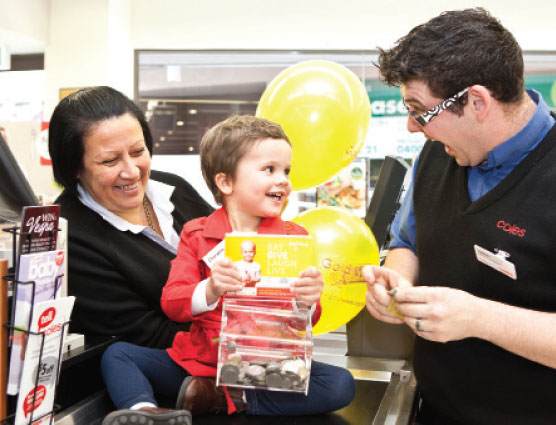
Carbon and energy
Greenhouse emissions
Our total greenhouse gas emissions were estimated to be 2,523,808 tonnes of CO2e, 0.3 per cent less than last year and equates to 78.7 tonnes of CO2e per million dollars of revenue, down 7.2 per cent on last year.
Energy use
Our main uses of energy are electricity for refrigeration, lighting and cooling our stores, and natural gas and liquefied petroleum gas for space and hot water heating.
Our energy consumption this year was 7,266,775 gigajoules, down 1.7 per cent on last year.
This year, our energy consumption per million dollars of revenue was 227 gigajoules, down 8.0 per cent on last year.
As part of managing our business responsibly, we continued to focus on ways to use energy more wisely and reduce our greenhouse gas emissions.
Last year, we reported on three energy efficiency programs for our supermarkets which are well progressed:
- night blinds installed on refrigeration cases which reduce night-time energy use
- automatic lighting controls to reduce energy use outside trading periods
- anti-condensate heater controls installed to glass door freezers which reduce the energy use of the heaters in the doors.
New initiatives for the year included the first deployment of voltage optimisation technology to 42 stores.
Based on trials, we expect this technology to reduce the incoming voltage to the store and reduce total store power consumption.
Together with the GBCA we finalised a 'Greenstar' rating tool for future freehold supermarket developments. The first development to use the tool as a benchmark is our new store at Greenacre, New South Wales, which is currently under construction.
Governance
Ethical sourcing
In line with our approach of ensuring suppliers of Coles brand products comply with our ethical sourcing policy, over the past year we audited 85 suppliers out of 316 operating in non-Organisation for Economic Co-operation and Development member countries.
Of these audits, one critical non-compliance (the employment of an underage worker) by a supplier operating in China was identified and a corrective action put in place.
The supplier has committed to an improved system to prevent any further reoccurrence of this issue and will be audited again within three months.
In addition to this approach, we ask our suppliers in lower risk regions to self-assess their compliance to our ethical sourcing policy. During the year, 240 suppliers completed this self-assessment.
Ingredients and labelling
Labelling Logic, the final report of the Federal Government's Food Labelling Review panel was released in January 2011.
The report makes recommendations for changes to front of pack nutritional labelling, new technologies and country of origin labelling.
The report is currently being considered by health ministers and their response will be forwarded to the Council of Australian Governments meeting in early 2012.
Salt reduction
Coles participates in the Federal Government's food and health dialogue roundtables, which set the nutrition targets for product categories.
This year, for Coles-branded products, we delivered a further eight per cent sodium reduction in breakfast cereals and finalised our plans to meet bread, simmer sauces and processed meat targets in the required timeframes.
Nutritional labelling
We continued to introduce Daily Intake (DI) nutritional labelling for Coles-branded products during the year, including seasonal products for 2011.
Approximately 1,500 products were rebranded with DI labelling to help our customers make choices that meet their dietary requirements.
Country of origin
We always seek to comply with country of origin labelling requirements; however, during the year we were fined for not labelling imported grapefruit for sale at our supermarket at St Marys, New South Wales. This was caused by an IT error. We have since invested in IT enhancements and reviewed our internal labelling procedures to improve country of origin labelling compliance in our fresh produce department.
Palm oil
In April 2011, we appeared at the Senate hearing on the Food Standards Amendment (Truth in Labelling – Palm Oil) Bill 2010.
We continue to clearly label palm oil where it is used in Coles brand products, rather than using the term blended vegetable oils, as we believe this makes it easier for our customers to make an informed purchasing decision.
We have committed to moving to certified sustainable palm oil for Coles brand products by 2015 and have joined the Roundtable on Sustainable Palm Oil.
Senate milk inquiry
Following a reduction in the price of Coles branded milk in January 2011, a Senate inquiry was launched into the potential impact on the Australian dairy industry.
Although Coles does not pay dairy farmers directly, ahead of lowering the price of milk we increased the price we pay to processors.
The interim Senate report was released in April, acknowledging that customers had benefitted from our lower prices and a final Senate report is due to be released before the end of October 2011.
In July 2011, the Australian Competition and Consumer Commission announced there was no evidence that Coles' milk price discounting was in breach of the Competition and Consumer Act. Further, that the major impact of the reduction in milk prices since January seemed to have been a reduction in the supermarkets' profit margins on house brand milk.
Biofuels
As at June 2011, there are 292 Coles Express sites in New South Wales, Australian Capital Territory, Queensland and Victoria offering ethanol blended fuel.
Trolleys
As part of our ongoing commitment to reduce trolley abandonment, Coles has expanded the use of Carttronics wheel lock perimeter systems, which now operate at over 30 stores.
Shopping bags
Further to the ban on lightweight single-use plastic shopping bags by the South Australian Government in 2009, legislation has been passed to ban these bags in Northern Territory and Australian Capital Territory.
The Tasmanian Government has also announced a proposal to ban plastic bags, which is likely to take effect in 2012.
Following the success of our green bag recycling program in June 2010, where customers returned old or unwanted shopping bags made of polypropylene to Coles, we launched a second bag drive in September 2010.
Approximately 78,000 bags were returned and converted into outdoor furniture and donated to 100 primary schools across Australia.
Tobacco
During the year, there were further bans on the display of tobacco products in Western Australia, Northern Territory, Victoria and Tasmania.
Changes relating to display, ticketing, signage and licensing were required. Queensland, now the only jurisdiction without a ban on the display of tobacco, will follow in the coming year.
Liquor reform in Alice Springs
During the year, we responded to concerns over alcohol consumption in Alice Springs, Northern Territory by announcing a range of measures which apply from 1 July 2011:
- a minimum price for 750 millilitre bottled wine of $7.99 (equivalent to $1.14 per standard drink)
- withdrawing all two litre cask wine products
- ceasing national liquor promotions in Alice Springs.
Gaming
Coles operates 93 hotels with 83 gaming rooms. The majority of these are based in Queensland. All team members are trained in the Responsible Service of Gaming.
Community
This year, we raised and contributed more than $22.3 million to community programs and emergency relief. Of this, $5.34 million was in aid of the Queensland Premier's Disaster Relief Appeal to assist those affected by Cyclone Yasi and the Queensland floods. See page eight for further details of our response.
During the year, $7 million of sporting equipment was distributed to more than 7,600 schools across Australia as part of our Sports for Schools program.
We also supported Daffodil Day, raising more than $1.6 million for the Cancer Council Helpline and continued to support children's hospitals in Western Australia, Queensland and New South Wales through customer fundraising.
In March 2011, we celebrated funding 1,000 school and community garden projects through the Coles Junior Landcare Garden Grants program since its launch in 2008. These schools were invited to participate in a photo competition and more than 590 entries were received for three age categories, as well for the Australian Geographic award and the People's Choice award.
Economic investment
Our total sales for the year were $32 billion and our earnings before interest and tax were $1.17 billion – up 21 per cent on last year.
As at 30 June 2011, we have 741 supermarkets, 785 liquor stores, 93 hotels and 620 Coles Express sites.
In the coming year, we will continue to open new and refurbished supermarkets and develop new services to meet the needs of our customers.
This year, we raised and contributed more than $22.3 million to community programs and emergency relief.
Left: Former patient Charlotte, the face of Coles fundraising for the Sydney Children's Hospital Gold Week Telethon, pictured with team members at Coles, Oatley.



